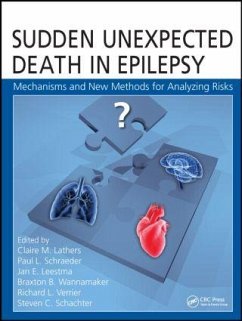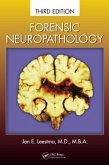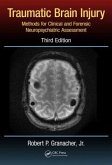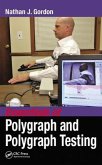Sudden Unexpected Death in Epilepsy
Mechanisms and New Methods for Analyzing Risks
Herausgeber: Lathers, Claire M; Schachter MD, Steven C; Verrier F a C C Ph D, Richard L; Wannamaker, Braxton B; Leestma, Jan E; Schraeder, Paul L
Sudden Unexpected Death in Epilepsy
Mechanisms and New Methods for Analyzing Risks
Herausgeber: Lathers, Claire M; Schachter MD, Steven C; Verrier F a C C Ph D, Richard L; Wannamaker, Braxton B; Leestma, Jan E; Schraeder, Paul L
- Gebundenes Buch
- Merkliste
- Auf die Merkliste
- Bewerten Bewerten
- Teilen
- Produkt teilen
- Produkterinnerung
- Produkterinnerung
This book builds on earlier works focusing on the clinical problem of sudden unexpected death in epilepsy (SUDEP). Developed over the last two years, the SUDEP Classification System and Risk Factor Cluster ID method will help to address gaps in knowledge about the causes and possible prevention of this tragic complication. The book includes case studies of SUDEP and discusses how physicians can identify individuals at risk for SUDEP and possibly lessen the chance of occurrence. It also describes related clinical and animal studies needed to classify risk factors for SUDEP victims.
![Forensic Neuropathology Forensic Neuropathology]() Jan E LeestmaForensic Neuropathology245,99 €
Jan E LeestmaForensic Neuropathology245,99 €![Traumatic Brain Injury Traumatic Brain Injury]() Robert P GranacherTraumatic Brain Injury213,99 €
Robert P GranacherTraumatic Brain Injury213,99 €![Investigative Forensic Hypnosis Investigative Forensic Hypnosis]() Joe NiehausInvestigative Forensic Hypnosis182,99 €
Joe NiehausInvestigative Forensic Hypnosis182,99 €![Essentials of Polygraph and Polygraph Testing Essentials of Polygraph and Polygraph Testing]() Nathan J GordonEssentials of Polygraph and Polygraph Testing201,99 €
Nathan J GordonEssentials of Polygraph and Polygraph Testing201,99 €![Necrophilia Necrophilia]() Anil AggrawalNecrophilia213,99 €
Anil AggrawalNecrophilia213,99 €![Autoerotic Deaths Autoerotic Deaths]() Anny SauvageauAutoerotic Deaths183,99 €
Anny SauvageauAutoerotic Deaths183,99 €![Forensic Anthropology Forensic Anthropology]() Natalie R LangleyForensic Anthropology129,99 €
Natalie R LangleyForensic Anthropology129,99 €-
-
-
- Produktdetails
- Verlag: CRC Press
- Seitenzahl: 350
- Erscheinungstermin: 1. März 2015
- Englisch
- Abmessung: 277mm x 213mm x 25mm
- Gewicht: 1021g
- ISBN-13: 9781482223859
- ISBN-10: 1482223856
- Artikelnr.: 41368787
- Verlag: CRC Press
- Seitenzahl: 350
- Erscheinungstermin: 1. März 2015
- Englisch
- Abmessung: 277mm x 213mm x 25mm
- Gewicht: 1021g
- ISBN-13: 9781482223859
- ISBN-10: 1482223856
- Artikelnr.: 41368787
Mystery: Risk Factors in SUDEP. SUDEP: A Syndrome with Several If Not Many
Potential Underlying Mechanisms. Unravel the Global Mystery of SUDEP.
Decision Analysis and Classification Methods for SUDEP Risk Factor
Identification. Forensic SUDEP Cluster Risk Factor Identifier Method.
Forensic Cases Classified as SUDEP Cluster Risk Factor Identifiers. How to
and How Not to Use Cluster ID Method. Clinical Cases Classified as SUDEP
Cluster Risk Factor Identifiers. SUDEP: Continued Forensic Challenges. A
South Carolina Cohort of Epilepsy Patients. Measuring the Incidence of
SUDEP Using Forensic and National Data. Risk Predictor: Individual SUDEP
Risk Factor Cluster IDs. Intracranial Pressure, Cerebral Edema, and
Obstructive Sleep Apnea: A Risk Factor Cluster for SUDEP? Neurocardiac
Interactions in Sudden Unexpected Death in Epilepsy: Can Ambulatory
Electrocardiogram-Based Assessment of Autonomic Function and T-Wave
Alternans. Help to Evaluate Risk? Patient Management Using Cluster Risk
Factor Identifiers. Future Clinical and Animal Studies. Animal Model
Cluster IDs: Mechanisms and Risk Factors for SUDEP. SUDEP Animal Models:
Mechanisms of Risks.Sudden Death Animal Models to Study Nervous System
Sites of Action for Disease and Pharmacological Intervention. A
Characterization of the Lockstep Phenomenon in Phenobarbital-Pretreated
Cats. Relationship of the Lockstep Phenomenon and Precipitous Changes in
Blood Pressure. Interspike Interval Histogram Characterization of
Synchronized Cardiac Sympathetic Neural Discharge and Epileptogenic
Activity in the Electrocorticogram of the Cat. SUDEP Risk Mechanisms:
Animal Models and Clinical Studies. Abnormal Brain Activity Triggers
Long-Term Potentiation in Sympathetic Ganglia: Implication for Sudden
Death. ß1-Adrenergic Blockade Prevents Cardiac Dysfunction and Increased
Susceptibility to Experimental Arrhythmias Following Status Epilepticus in
Rats. Cardiac Myocyte Damage, Electrocardiographic Dysfunction, and Ion
Channel Remodeling in Rodent Models of Seizure Disorders. A Rat Model for
Exploring the Contributions of Ventricular Arrhythmias to Sudden Death in
Epilepsy. Neurotransmitters Implicated in Control of Sudden Unexpected
Death in Epilepsy in Animal Models. n-3 Fatty Acids and Sudden Unexpected
Death in Epilepsy: A Translational Approach. Sudden Death in Epilepsy:
Relationship to the Sleep-Wake Circadian Cycle and Fractal Physiology.
Lockstep in Humans: Bridging the Gap. Postictal Generalized EEG Suppression
and Sudden Unexpected Death in Epilepsy. Mechanisms of SUDEP: Lessons from
Cases Occurring in the Epilepsy Monitoring Unit. Compliance with
Antiepileptic Drug Treatment and the Risk of SUDEP. Providing Information
about SUDEP: The Benefits and Challenges. Mechanistic SUDEP Risk Factor
Studies for Animals and Humans. Index.
Mystery: Risk Factors in SUDEP. SUDEP: A Syndrome with Several If Not Many
Potential Underlying Mechanisms. Unravel the Global Mystery of SUDEP.
Decision Analysis and Classification Methods for SUDEP Risk Factor
Identification. Forensic SUDEP Cluster Risk Factor Identifier Method.
Forensic Cases Classified as SUDEP Cluster Risk Factor Identifiers. How to
and How Not to Use Cluster ID Method. Clinical Cases Classified as SUDEP
Cluster Risk Factor Identifiers. SUDEP: Continued Forensic Challenges. A
South Carolina Cohort of Epilepsy Patients. Measuring the Incidence of
SUDEP Using Forensic and National Data. Risk Predictor: Individual SUDEP
Risk Factor Cluster IDs. Intracranial Pressure, Cerebral Edema, and
Obstructive Sleep Apnea: A Risk Factor Cluster for SUDEP? Neurocardiac
Interactions in Sudden Unexpected Death in Epilepsy: Can Ambulatory
Electrocardiogram-Based Assessment of Autonomic Function and T-Wave
Alternans. Help to Evaluate Risk? Patient Management Using Cluster Risk
Factor Identifiers. Future Clinical and Animal Studies. Animal Model
Cluster IDs: Mechanisms and Risk Factors for SUDEP. SUDEP Animal Models:
Mechanisms of Risks.Sudden Death Animal Models to Study Nervous System
Sites of Action for Disease and Pharmacological Intervention. A
Characterization of the Lockstep Phenomenon in Phenobarbital-Pretreated
Cats. Relationship of the Lockstep Phenomenon and Precipitous Changes in
Blood Pressure. Interspike Interval Histogram Characterization of
Synchronized Cardiac Sympathetic Neural Discharge and Epileptogenic
Activity in the Electrocorticogram of the Cat. SUDEP Risk Mechanisms:
Animal Models and Clinical Studies. Abnormal Brain Activity Triggers
Long-Term Potentiation in Sympathetic Ganglia: Implication for Sudden
Death. ß1-Adrenergic Blockade Prevents Cardiac Dysfunction and Increased
Susceptibility to Experimental Arrhythmias Following Status Epilepticus in
Rats. Cardiac Myocyte Damage, Electrocardiographic Dysfunction, and Ion
Channel Remodeling in Rodent Models of Seizure Disorders. A Rat Model for
Exploring the Contributions of Ventricular Arrhythmias to Sudden Death in
Epilepsy. Neurotransmitters Implicated in Control of Sudden Unexpected
Death in Epilepsy in Animal Models. n-3 Fatty Acids and Sudden Unexpected
Death in Epilepsy: A Translational Approach. Sudden Death in Epilepsy:
Relationship to the Sleep-Wake Circadian Cycle and Fractal Physiology.
Lockstep in Humans: Bridging the Gap. Postictal Generalized EEG Suppression
and Sudden Unexpected Death in Epilepsy. Mechanisms of SUDEP: Lessons from
Cases Occurring in the Epilepsy Monitoring Unit. Compliance with
Antiepileptic Drug Treatment and the Risk of SUDEP. Providing Information
about SUDEP: The Benefits and Challenges. Mechanistic SUDEP Risk Factor
Studies for Animals and Humans. Index.








